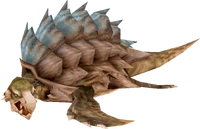Template:Sideicon

Oh, shut up and help me remodel the Boss theme page!
Boss themes are recurring pieces of music in the Final Fantasy series. They play during the majority of the boss fights in a game.
Boss themes do not play in every boss battle of a game. Final bosses have had their dedicated theme since Final Fantasy III, and normally, special themes accompany series of bosses fought in sequence before the final battle. Certain bosses may have their respective battle motif: Gilgamesh, a recurring boss in Final Fantasy V, is faced with his leitmotif, "Clash on the Big Bridge", playing in four out of five encounters; and Jenova another recurring boss, but from Final Fantasy VII, is fought while her eponymous theme plays, and "Jenova Absolute" plays solely during the last battle against her.
Some groups of antagonists share a single theme: Golbez and his Archfiends, from Final Fantasy IV are fought to the sound of "Battle With the Four Fiends". Finally, some bosses are fought while an ongoing background theme plays, such as in the initial sequence of Final Fantasy VII, and in Chapter 12 of Final Fantasy XIII where "Opening - Bombing Mission" and "Eden under Siege" play continuously, respectively.
For more specific information regarding boss themes not explored on this page, see List of battle themes.
Appearances
Final Fantasy
Originally, there was no distinction between the boss battle theme and the main battle theme, but in later remakes three normal boss themes and a final boss theme were created for the game. The first, "Inside the Boss Battle", plays during minor boss battles such as Garland or the Vampire.
Final Fantasy II
In the original Famicom version, both "Battle Theme 1" and "Battle Theme 2" played during boss battles, with the former also playing during random encounters and the latter playing at the final battle.
However, in the remakes, like in Final Fantasy, a remastered soundtrack included two new remixed battle tracks by Tsuyoshi Sekito. "Battle Scene B" is a remix of "Battle Theme 2" plays during easier boss fights, while "Battle Scene A", a remix of "battle theme 1", plays during more difficult ones.
Final Fantasy III
"Battle 2" plays during all normal boss fights. This is the only game in the main series to have one single theme that plays during every boss fight, with the clear exception of the final boss.
Final Fantasy IV
"Battle 2" is the boss battle music that plays for normal boss battles (it begins with the intro to a traditional normal battle theme). Additionally, "Battle With the Four Fiends" plays during fights with the Archfiends, Golbez, and some bosses in the final dungeon.
Final Fantasy IV -Interlude-
The same boss theme from Final Fantasy IV is used.
Final Fantasy IV: The After Years
The boss themes from the original Final Fantasy IV return. However, a new battle theme called "The Dispossessed Eidolons ~Minudes~" plays during all battles with Maenads and Eidolons at the end of each episode.
Final Fantasy V
"Battle 2" plays during most boss battles, with exception of the battles against Gilgamesh and Exdeath. The theme also appears in Dissidia 012 Final Fantasy and Theatrhythm Final Fantasy Curtain Call.
Final Fantasy VI
"The Decisive Battle" plays during most boss fights, while "Battle to the Death" plays during even more challenging boss battles, such as Ultima Weapon and the Warring Triad.
Final Fantasy VII
"Fight On!" is the normal boss battle theme. It plays on almost every boss battle after the Guard Scorpion, with rare exceptions.
Final Fantasy VIII
"Force Your Way" is the normal boss battle theme, and it plays for almost all boss battles, with the exception of battles against Sorceresses, Bahamut, Diablos, and Ultima Weapon.
Final Fantasy IX
"Battle 2" is the normal boss battle theme.
Final Fantasy X
"Enemy Assault" plays during almost every boss battle, but it is replaced with "Challenge" in some instances, particularly in the endgame.
Final Fantasy X-2
"YRP Battle 2" is used during most boss battles with exception of the Leblanc Syndicate, aeons, and optional bosses.
Final Fantasy XI
The original game and its expansions have boss themes that play during boss battles and other battlefield events. "Tough Battle" plays in the original games' boss battles/battlefields (including most add-on expansion bosses). "Tough Battle #2" plays during Rise of the Zilart boss battles/battlefields.
"Turmoil" plays during Chains of Promathia boss battles/battlefields, as well as during Limbus. "Hellriders" plays during Treasures of Aht Urhgan boss battles/battlefields, as well as during Einherjar. Wings of the Goddess has three different themes that play during various boss battles/battlefields: "Kindred Cry," "Under a Clouded Moon," and "Run Maggot, Run!".
Final Fantasy XII
"Boss Battle" plays during fights with the normal bosses, with a shortened version played during minor boss fights. The Zodiac Age remaster version introduces "Fury of the Entities" and "The Guardians," which replace the original boss themes in certain fights.
Final Fantasy XIII
"Saber's Edge" is the main boss theme of the first nine chapters, as well as the background theme during part of the party's assault on Eden.
Final Fantasy XIII-2
"Limit Break!" serves as the boss theme for the majority of boss battles. However, "Worlds Collide" is used for the bosses Paradox Alpha, Aloeidai and Kalavinka.
Lightning Returns: Final Fantasy XIII
"The Showdown" is the boss theme of regular boss battles.
Final Fantasy XIV
The Final Fantasy XIV/Legacy contains three regular boss themes, each one dependent upon the region in which the bosses are fought. However, all are unnamed and can only be found on betas for the game.
In addition, each of the Primals have their own unique boss themes, with "Fallen Angel" playing for the battle against Garuda, "Primal Judgement" playing for the battle against Ifrit, "Under the Weight" playing for the battle against Titan and both "Seven Jesters" and "Good King Moggle Mog XII" playing for the battle against Good King Moggle Mog.
"Imperium" serves as the boss theme for the battle against the Lunar Transmitter and the machine-like monsters defending it.
A Realm Reborn has three boss themes: "A Fine Death," "Nemesis," and "Torn From the Heavens," all of which vary depending on the difficulty of the boss.
"Steel Reason" plays when fighting Gaius's Tribunes, while Gaius himself is fought to the song "Bite Of The Black Wolf".
The generic boss theme for Heavensward bosses is "Ominous Prognisticks", composed by Masayoshi Soken.
Final Fantasy XV
While the game has multiple boss themes, "Omnis Lacrima" is by far the most common. In the Final Fantasy XV Episode Duscae demo, it plays when fighting Deadeye. In the game proper, it plays when fighting most monster bosses, such as the aforementioned Deadeye, Grootslang or Griffon.
Other boss themes include:
- "Invidia", the boss theme that plays in the boss battles against the Niflheim Empire.
- "Apocalypsis Noctis", which plays against Titan. "Apocalypsis Aquarius" is the version of the theme that plays against Leviathan.
- "Ravus Aeterna" plays in the battle against Ravus.
- "Hellfire", which plays against Ifrit.
- "Magna Insomnia", the final boss theme.
Final Fantasy Tactics
"The Pervert", also translated as "Helldance", plays during battles with the Lucavi. "Decisive Battle" and "Under the Stars" are also used in single major battles: the battle against the Corpse Brigade's troops at the Merchant City of Dorter and the battle against Isilud Tengille, respectively.
Final Fantasy Tactics Advance
"The Road We Both Aim For" plays during battles that involve Totema.
Final Fantasy Type-0
"War: Howl of the Dreadnought" is the main boss theme for most of the powerful bosses.
Final Fantasy Crystal Chronicles
"Monster Dance ~Rondo~" is the boss theme.
Final Fantasy Crystal Chronicles: Ring of Fates
One of this game's boss themes is titled "One-On-One Battle!".
Final Fantasy Crystal Chronicles: Echoes of Time
"Boss Theme 1" is used for most bosses, but "Boss Theme 2" is used in fights in bosses near the end of the game.
The Final Fantasy Legend
The boss theme is "Fierce Battle", which plays during battle with the Four Fiends, Machine, Ashura and also during tense, pre-battle sequences against these same bosses, transitioning without cut into the battle itself. Lesser bosses are all simply variations of minor enemies and so are fought against the standard battle theme.
Final Fantasy Legend II
The boss theme is "Decisive Battle", plays against the New Gods and several other unique foes, including, once again, WarMach.
Final Fantasy Legend III
The boss theme is "Gods of Another Dimension", which plays against all major Purelander bosses.
Final Fantasy Mystic Quest
The boss theme is "Battle 2", and plays during every boss battle except the battle with Dark King.
Final Fantasy: The 4 Heroes of Light
"A Strong Enemy" is the normal battle theme for most bosses, and plays during the first part of the battle with Chaos. "The Demon King's Servants" play against stronger bosses, and also plays during the second round of the Chaos battle.
Bravely Default
There are two themes for most boss battles: "He of the Name" plays during battles against asterisk holders and the Adventurer, while "Fighting to the End" plays during most event battles and boss battles against monsters.
Bravely Second: End Layer
"Battle of Tribulations" is the main boss theme. It plays during battles with the asterisk holders of the Glanz Empire and most other exclusive bosses.
Final Fantasy Dimensions
"Against the Threat", known in Japan as "Face the Threat", is the normal boss theme. Its opening sounds similar to "Force Your Way" from Final Fantasy VIII.
Final Fantasy Brave Exvius
"Onslaught" is the normal boss theme, and plays during most boss battles. "Celestial Battle" plays during boss battles against espers and key battles, such as those against the Sworn Six of Paladia.
For event bosses, many of the past series' boss themes are reused, and played in their original version. In a similar vein, story bosses which reference past games (such as the Guardian battle that mirrors the fight against same enemy in Final Fantasy VI) play a soundtrack from its respective game – in this case, "Protect the Espers!".

